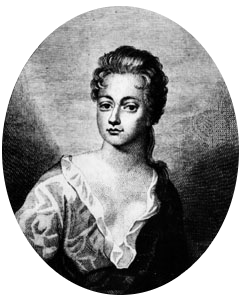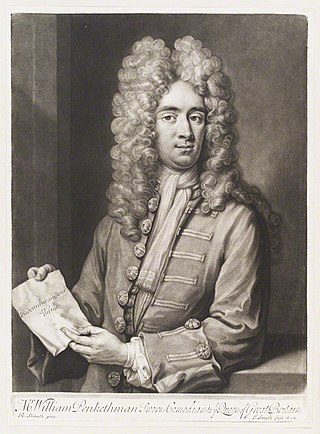Related Research Articles

Colley Cibber was an English actor-manager, playwright and Poet Laureate. His colourful memoir An Apology for the Life of Colley Cibber (1740) describes his life in a personal, anecdotal and even rambling style. He wrote 25 plays for his own company at Drury Lane, half of which were adapted from various sources, which led Robert Lowe and Alexander Pope, among others, to criticise his "miserable mutilation" of "crucified Molière [and] hapless Shakespeare".

The Relapse, or, Virtue in Danger is a Restoration comedy from 1696 written by John Vanbrugh. The play is a sequel to Colley Cibber's Love's Last Shift, or, The Fool in Fashion.

Anne Oldfield was an English actress and one of the highest paid actresses of her time.
Susanna Verbruggen, aka Susanna Mountfort, was an English actress working in London.
Barton Booth was one of the most famous dramatic actors of the first part of the 18th century.

Theophilus Cibber was an English actor, playwright, author, and son of the actor-manager Colley Cibber.

Anne Bracegirdle was an English actress.
Christopher Rich (1657–1714) was a lawyer and theatrical manager in London in the late 17th and early 18th century.
Mary Kent was an English actress, whose career lasted from 1692 to 1718. Her dates of birth and death are not known. She was the wife of Drury Lane actor Thomas Kent.

Charlotte Charke was an English actress, playwright, novelist, and autobiographer. She began acting at the age of seventeen in breeches roles, and took to wearing male clothing off stage as well, performing and being publicly known as "Charles Brown" from 1741. Her later career and her writings were conducted under her own name, "Mrs. Charlotte Charke", and identified her as the daughter of Colley Cibber. After being unsuccessful in a series of jobs associated with men at the time, such as valet, sausage maker, farmer, and tavern owner, she succeeded in her career as a writer and continued her work as a novelist and memoirist until her death in 1760.

Robert Wilks was a British actor and theatrical manager who was one of the leading managers of Theatre Royal, Drury Lane in its heyday of the 1710s. He was, with Colley Cibber and Thomas Doggett, one of the "triumvirate" of actor-managers that was denounced by Alexander Pope and caricatured by William Hogarth as leaders of the decline in theatrical standards and degradation of the stage's literary tradition.
Thomas Elrington (1688–1732), was an English actor.

William Pinkethman was an English comic actor, a low comedian with a droll style, and theatre manager. He was considered an imitator of Anthony Leigh.

Thomas Walker (1698–1744) was an English actor and dramatist.
The Fair Example, or the Modish Citizen is a 1703 comedy play by the English writer Richard Estcourt, originally staged at the Drury Lane Theatre. It was part of a growing trend of plays to feature a plot of an honest wife reforming her rakish husband along with Sir Harry Wildair, As You Find It, The Wife's Relief and The Modish Couple. It is a reworking of the 1693 French play Les Bourgeoises à la Mode by Florent Carton Dancourt. In 1705 a separate English adaptation of the French work John Vanbrugh's The Confederacy appeared at the rival Queen's Theatre in the Haymarket.
John Mills (c.1670–1736) was a British stage actor. A long-standing part of the Drury Lane company from 1695 until his death, he appeared in both comedies and tragedies. His wife Margaret Mills was an actress, and his son William Mills also became an actor at Drury Lane.
Mary Willis was a British stage actress of the eighteenth century.
John Thurmond was a British stage actor. To distinguish him from his son, also an actor named John, he is sometimes called John Thurmond the Elder.
Jane Lucas was an English stage actress and singer of the late seventeenth and early eighteenth century. From around 1693 she was a member of the United Company based at the Theatre Royal, Drury Lane. In 1697 she had fellow actor Colley Cibber arrested, although the reason was not clear and she remained acting in the company alongside him for some years afterwards.
Henry Norris (1665–1730?), also known as "Jubilee Dicky", an English actor.
References
![]() This article incorporates text from a publication now in the public domain : Knight, John Joseph (1894). "Mills, John (d.1736)". In Lee, Sidney (ed.). Dictionary of National Biography . Vol. 37. London: Smith, Elder & Co.
This article incorporates text from a publication now in the public domain : Knight, John Joseph (1894). "Mills, John (d.1736)". In Lee, Sidney (ed.). Dictionary of National Biography . Vol. 37. London: Smith, Elder & Co.